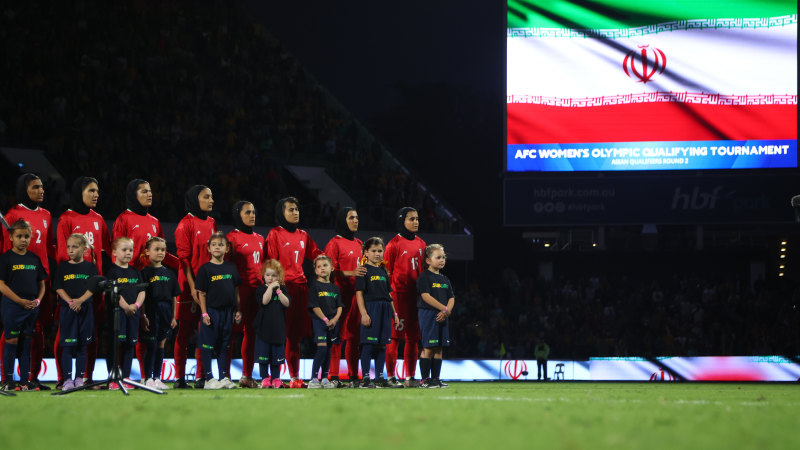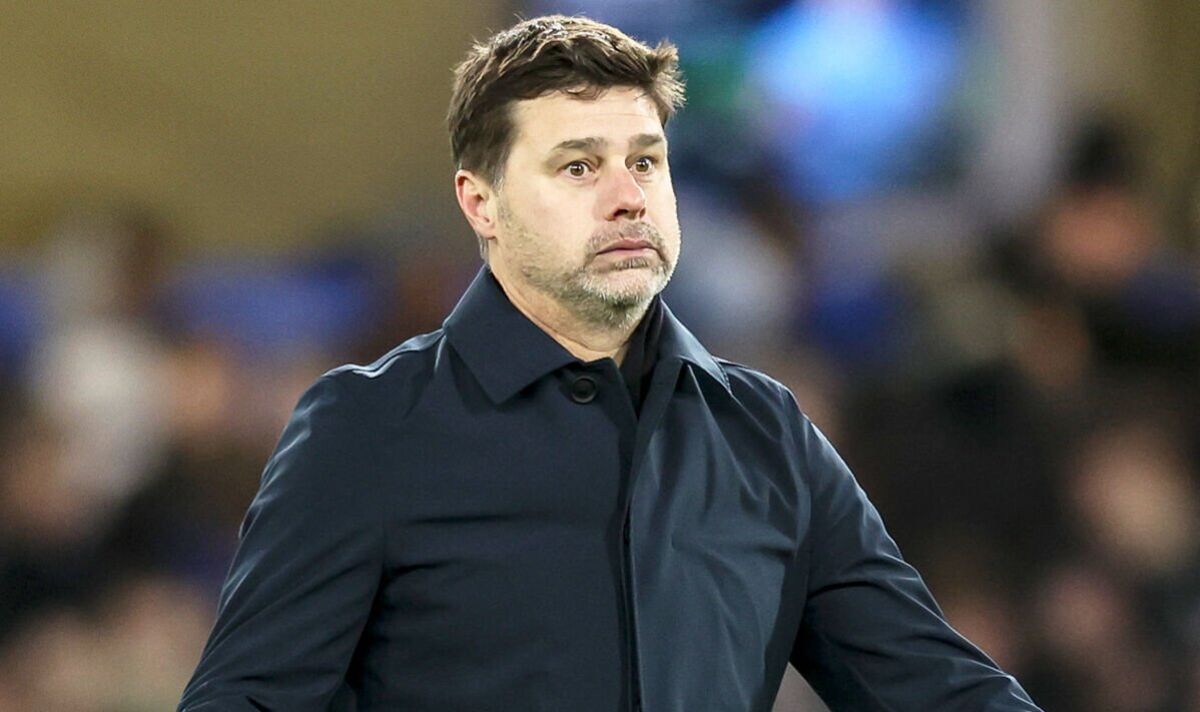Save articles for later
Add articles to your saved list and come back to them any time.
Many of the Matildas would have been fast asleep by the time Iran started dinner. Training finished at 8.30pm and the buffet was still being pilfered well after 10.15pm. Their coach, Maryam Azmoon, cannot get her head around how early Perth shuts down for the evening. Some streets in her home city of Rasht, by the Caspian Sea, are open all night.
“Outside, eating kebab,” she says. “You like kebab?” Affirmative. “But nobody is around here.” She gestures outside. Her bedtime is as late as 1.30am. “Maybe Wednesday and Friday, all the night wake up.” I tell her my bedtime is 10pm. She points out that 10pm is in nine minutes’ time, and hopes aloud that I’ve brought my pillow.
Iran head coach Maryam Azmoon during a press conference in Perth.Credit: Getty
Before Azmoon emerges, the first point of contact is the team’s press officer, Mohamad Jamaat. He is quite clearly the only man in camp and says it is unusual for a male to manage media for a women’s team. But he was asked to come across from the men’s team, with whom he worked at the 2022 World Cup in Qatar. The very mention of it brings back memories of the Mahsa Amini protests, labelled the most widespread revolt since the Islamic Revolution in 1979 and a “fully-fledged human rights crisis” by the United Nations High Commissioner for Human Rights chief, Volker Turk.
It makes you think of Carlos Queiroz’s squad refusing to sing Iran’s national anthem before their World Cup opener against England, and of the reported threats they received from the Tehran regime of imprisonment and torture of their families should they not behave themselves in their next match against the US. They duly sang the anthem. Jamaat agrees it was a stressful time, but does not offer words or body language commensurate with the subject matter.
Other separate, well-informed sources are fearful of some of the people around the national set-up but believe the players to be good people who just want to play football. This is the cognitive dissonance one experiences during a single meeting, in the sleepy city of Perth. Logic suggests real life behind the scenes is vastly more complex than us outsiders could comprehend.
That thought, too, has you second-guessing your words. What questions are safe to ask a head coach with very little English and whose Farsi (of which I have none) is communicated through an interpreter? The interpreter also happens to be the executive manager of the team. Does this mean anything? Am I reading too much into it?
A picture of Iranian Mahsa Amini on the tail of the charter plane the Brazilian women’s football team used to fly to Brisbane on July 4.Credit: Reuters
What would happen if you were to reference the Brazil team’s politically motivated mode of transport to Australia for the Women’s World Cup: a plane bearing giant images of Amini and Iranian footballer Amir Nasr Azadani, who was arrested during the protests and sentenced to 26 years in prison? Is there potential for this question, or the answer it prompts, to do harm to someone, somewhere?
And what about “Blue Girl”? The Iranian football fan, Sahar Khodayari, who died in hospital in 2019 after setting herself on fire outside a court in Tehran? She had been charged with “appearing in public without a hijab” after trying to enter Azadi Stadium dressed as a man, flouting the country’s infamous ban on women in sports stadiums.
We read in Iran media that authorities have finally approved the entry of women into stadiums to watch matches. Another anonymous Iranian tells me the reality looks more like security ushering in a hand-picked few and then ensuring photos and videos are captured as proof to FIFA that it is happening.
These are all questions on the tip of my tongue, but something is stopping me from asking them. Ears seem to be listening, and the rules of engagement have not been clearly laid out. In the end, sometimes you have only what is in front of you, and Azmoon herself is warm and engaging. A former footballer herself, she speaks passionately about the two years she spent coaching the under-20 national team and, when she retook the reins from Maryam Irandoost in 2022, transitioned seven of those players into the senior team which is right now in Australia.
She talks about the domestic league and efforts to scout talented girls. After her 63rd-ranked side conceded only two goals against 11th-ranked Australia, she asked for a selfie with coach Tony Gustavsson and gushed about Sam Kerr (both women watched the Women’s World Cup via illegal but highly accessible satellite TV channels).
“If I have to be honest with you, we have only seen these players on the TV, and we know that they are very strong,” she said on Thursday night. “When we wanted to vote for the best women football players for the FIFA website, I have voted for Sam Kerr.
“I really love her, but I told my players that it must be your honour to play against them. Please do not feel afraid of them and do your best. My players, they didn’t feel afraid of them … my players played with their hearts, because we are representative of 18 million people in Iran, and half of them … must be women, and they pray for us. That’s why I think that my players were so brave to play against this team.” This is the closest thing to a statement Azmoon has said.
At the hotel two days earlier, she describes her senior team as “underdeveloped”. The women’s national set-up has been active post-revolution only since 2005, when American-Iranian Katayoun Khosrowyar visited Iran for the first time on a family holiday, was scouted on the back of a game of futsal – futsal is huge among women in Iran because it can be played indoors – and ended up moving to Tehran and captaining the national team (after retiring she became a national youth coach). That first step was taken when Jordan invited Iran to send a team to contest the 2005 West Asian Women’s Football Championship.
Fatemeh Amineh Borazjani tries to get past Sam Kerr.Credit: Getty
In 2011, they were forced to forfeit their bid to qualify for the 2012 Olympics because, during Sepp Blatter’s creepy women-could-wear-tighter-shorts era, FIFA briefly banned the wearing of hijabs. Once the ban was lifted in 2012, play resumed. But nailing down international fixtures has not been easy. They cite a lack of international friendlies as a crucial development gap, saying they wrote to 19 federations but received little interest.
They ended up playing two July friendlies against Russia, who were not eligible for the World Cup because of FIFA’s (now-lifted) blanket ban from international tournaments over its invasion of Ukraine. The only other two fixtures played in 2023 before this tournament were a 1-0 win and 1-1 draw with Myanmar in the first phase of Olympic qualifying in April. On Sunday, they will play Taiwan, before facing the Philippines on Wednesday. They will not make Paris 2024 but say they are richer for the experience gained along the way.
The general view of Iranians towards the women’s football team appears to be love. The general view towards the machine surrounding it differs wildly. Some yearn for the return of Irandoost, who twice served as coach, from 2010-12 and then 2021-22 – Azmoon’s period with the under-20s.
It was during Irandoost’s second stint that Iran qualified for the 2022 Women’s Asian Cup in India – the team’s first major tournament – at which they held hosts India goalless in their first match before losing to China and Taiwan. It was a historic moment, nonetheless, and she was praised as not just a coach with tactical nous, but also a feisty advocate for shifting the culture around women’s football inside Iran. But in this hotel, on this day, a mention of Irandoost to Azmoon does not elicit much of a response at all.
Female fans were restricted to one area of the stadium at the Iran-Cambodia match at Azadi Stadium in 2019.Credit: Getty
Before this week’s pre-tournament press conference, journalists were informed that any political questions would be shut down. Azmoon avoided the only one that came, because it went straight to Gustavsson, who was asked if Iran’s players would be disadvantaged by wearing mandatory hijabs in the Perth heat.
Gustavsson’s non-answer was shrewd enough to avoid a headline. “I wish I had my sports scientist next me, who would know all about climate and heat acclimation and performance,” he said. “I’m not an expert in that field, so I shouldn’t try to speculate on that.”
Afterwards, Jamaat described the journalist, from the London-based Persian-language satellite channel, Iran International TV, as “a dissident”.
Perhaps, at least, Azmoon may have some thoughts about the world’s perception of her country, good or bad. How does she feel when she sees international headlines?
Iran line up for the national anthem before Thursday’s 2-0 Olympic qualifying loss to Australia.Credit: Getty
“Maybe from [the] outside, you will see something else,” she says, via the interpreter. “When you see us, we are here and play match. It shows that there is nothing important. We, as women in Iran, we have opportunity to play as a football team, which in some other countries may be at stake.
“I think when you see from outside, you see the news – it’s not like this. We just think about football and the situation for women.
“Football players are very good, and we have good atmosphere, safety and security to play. We’re not involved with other things.”
Sports news, results and expert commentary. Sign up for our Sport newsletter.
Watch every match of the UEFA Champions League, UEFA Europa League and UEFA Europa Conference League on Stan Sport. All the action streaming ad-free, live and on demand, with select matches in 4K UHD.
Most Viewed in Sport
From our partners
Source: Read Full Article








